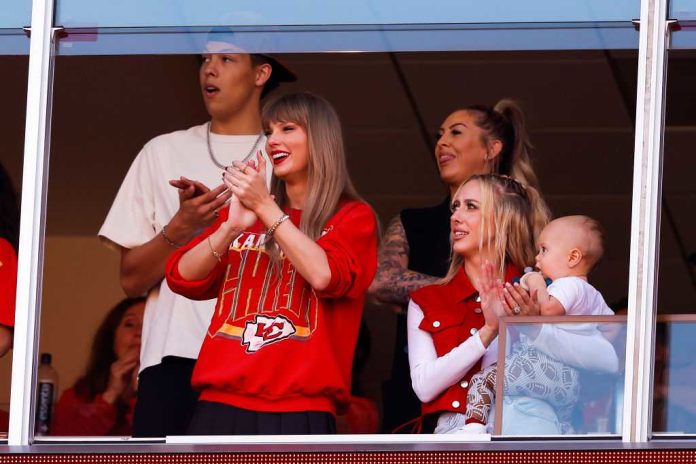
Can you be friends with someone you disagree with on certain topics?
When it’s about getting lunch yes, but when it comes to human rights, no. Friendship, at its core, is about connection—often based on shared values, mutual respect, or simply a good time over lunch. But does that connection hold up when deeper differences emerge?
Take, for example, the recent images of Taylor Swift and Brittany Mahomes, who have been photographed together at various events, from football games to the U.S. Open. Swift has been vocal about her political stance, recently endorsing Harris for the 2024 election. “I’m voting for @kamalaharris because she fights for the rights and causes I believe need a warrior to champion them,” Swift said in her recent Instagram post. “I was so heartened and impressed by her selection of running mate @timwalz, who has been standing up for LGBTQ+ rights, IVF, and a woman’s right to her own body for decades”. This follows her 2020 stance on liberal issues surrounding voting rights and LGBTQ+ rights.
Meanwhile, entertainment outlets pointed out how Brittany Mahomes liked an Instagram comment suggesting her support for Trump’s candidacy. Trump even thanked Mahomes on Truth Social, his self-established social media platform.
Addressing these conflicts matters because this goes beyond taking a political stance. The context is crucial, especially with recent developments like the Republican administration's Project 2025, which aims to overhaul key aspects of American governance, including restrictions on voting rights and executive power.
Political conversations aren’t merely about one’s stance, it’s about the many underlying issues that are at stake. We are used to believing that being able to “agree to disagree” on politics is inherently noble. Most of us are taught that being agreeable—especially in friendships—is more important than holding a firm stance on certain issues. I don’t believe in this anymore.
What’s the point of standing for something if the rituals of white civility always come first? Who does this mindset serve, and who benefits from it? Should LGBTQ+ individuals grab coffee with those who oppose their right to marry? Should survivors of gun violence sit in silence with friends who oppose any form of gun control? Should Black people hang out with friends who vote to erase Black history from schools?
The answer should be no. This mindset was never meant for the marginalized — it was created by and for a specific type of person, usually white, who ultimately has nothing to lose by passively enabling oppressive politics.
This brings us back to Swift and Mahomes. It's not about who they are individually, it's about what their public friendship represents. Are we supposed to believe that politics—especially when it comes to human rights—is something that can be “put aside” in the name of friendship? Does this not trivialize the harm caused by those political stances?
Swift’s platform, which she has used for good, also comes with the responsibility to hold those in her circle accountable. The stakes are too high to pretend that oppressive beliefs don’t matter, even when they come from a friend.
However, news outlets pointed out how Mahomes allegedly reconsidered her political stance after Trump expressed his dislike for Swift on Truth Social. This does not indicate Mahomes’ immediate switch in political stance, yet the evolution of their friendship is placed on a public pedestal susceptible to political controversy.
So, where do we draw the line? I’m not saying you shouldn’t befriend anyone who has different opinions. After all, growth often comes from engaging with diverse perspectives. However, as the saying goes, “We can disagree and still love each other unless your disagreement is rooted in my oppression and denial of my humanity and right to exist.”
In the polarized climate of U.S. politics, it may be wiser to remain acquaintances rather than close friends when such core values are at stake. If someone's political beliefs deny another person's right to exist, it’s not merely a difference of opinion—it’s a threat to justice.


